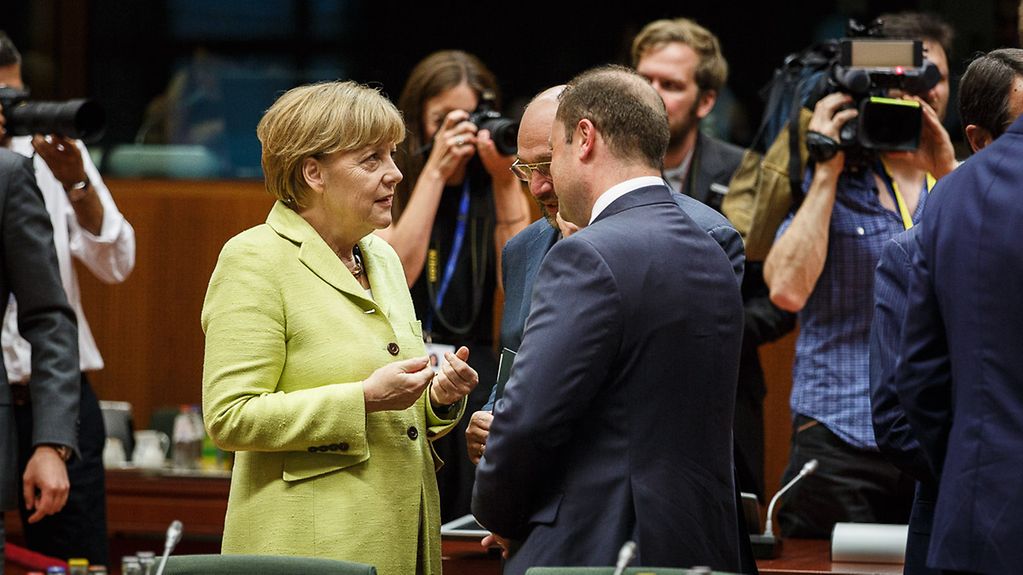Special meeting of the European Council
In view of the situation in Ukraine, the heads of state and government have, for the first time, imposed sanctions on Russian companies. Decisions on the top EU appointments have been postponed until a special meeting to be held on 30 August.

Three topics overshadowed the meeting: the situation in Ukraine and the Middle East, and top EU appointments
Photo: Bundesregierung/Denzel
Chancellor Angela Merkel saw three main points on the agenda of the special meeting of the European Council:
• Sanctions on Russia
• Achieving a ceasefire in the Middle East, and
• Top EU appointments.
Over the last few weeks the European Union has repeatedly endeavoured to resolve the conflict in eastern Ukraine. "Today, however, and in view of the conclusions taken at our last meeting, we see ourselves forced to say that the expectations the Ukrainian President had of a unilateral ceasefire have in no way been met."
EU restricts financial support for Russia
Sanctions on Russia will be stepped up to embrace private companies, where they are threatening or violating the sovereignty, the territorial integrity and the independence of Ukraine.
The Chancellor also reported that the EU will restrict its financial support for Russia, in matters relating to the European Neighbourhood Policy. The third area relates to assistance for projects in Russia provided by the European Investment Bank and the European Bank for Reconstruction and Development. "We have asked them not to finance any new projects for Russia," said Angela Merkel.
Defusing the situation in the Middle East
The European Council also looked at the situation in the Middle East. "We have stressed, once again, that Israel is entitled to defend its own interests, obviously while retaining a sense of proportion," said Angela Merkel. Now it is important to bring about a ceasefire. In this context, the heads of state and government welcomed the Egyptian initiative.
No agreement on top EU appointments
The Chancellor reported that there had been valuable discussion about top EU appointments. She quoted the President of the European Council, Herman Van Rompuy, who pointed out in Brussels that two attempts were needed before agreement could be reached on the EU’s multiannual financial framework for the period 2014 to 2020 – the first discussion took place in November 2012 and the second at the start of 2013. "This will be the same sort of thing. I am convinced that we will also manage to make a decision here, however," said Angela Merkel.
Another special meeting on 30 August will once again discuss these personnel issues. For Angela Merkel it is quite clear "that the composition of the Commission is the responsibility of the President of the Commission, with the exception of the appointment of the EU’s High Representative for Foreign Affairs and Security Policy, although naturally individual member states see certain links between these various issues."
The main posts to be filled are the President of the European Council and the EU’s High Representative for Foreign Affairs and Security Policy.
Member states have also been asked to make their proposals for their national EU Commissioners by the end of July. The German government has proposed the current Energy Commissioner Günther Oettinger for a second period in office.
Jean-Claude Juncker’s plans approved
The new President of the European Commission, Jean- Claude Juncker, used his first meeting with the EU’s heads of state and government to lay out his plans for the next European Commission. They were acknowledged and approved, "because they largely build on our fundamental principles," explained Angela Merkel.
At their last meeting on 26 and 27 June, the heads of state and government agreed on a strategic agenda for the next five years.